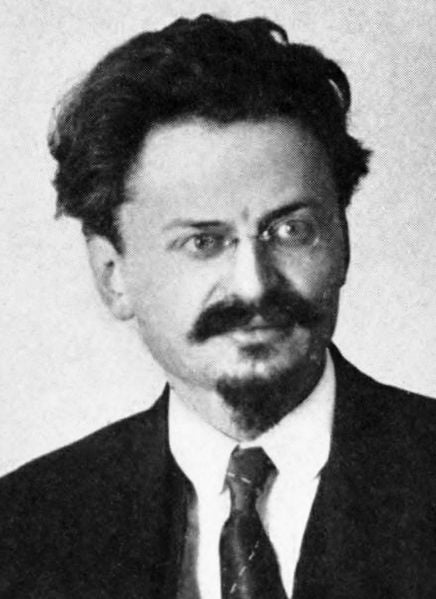*Image Credit: Wikimedia Commons In a tiny Ukrainian village, far from the glamorous capital of the Russian Empire, St. Petersburg, a legendary figure in the October Revolution was born on November 7, 1879. The fifth of eight children, Leon Trotsky — actually named Lev Davidovich Bronshtein — would go on to become one of the most influential men in the rise of the Bolsheviks and during the early years after the establishment of the Soviet Union. Growing up on a successful farm, Trotsky was fortunate enough to be enrolled in school in the port city of Odessa on the Black Sea, a far cry from his humble birthplace far from even a post office. Witnessing the confluence of cultures in the trade-heavy metropolis, he gained an appreciation for the wide differences between people of different nations. By the age of 17, Trotsky found himself filled with revolutionary zeal. Dropping out of college, he joined others in forming the South Russian Workers’ Union in the town of Nikolayev. Spreading Socialist doctrine amongst the disgruntled factory employees, he was arrested in January 1898 and imprisoned for two years without a hearing. Taking the time to read from the great philosophers and develop his understanding of Marxist ideology, Trotsky was shipped to Siberia for a four-year term beginning in 1900. As the Siberian summer warmed slightly in 1902, an opportunity to escape presented itself. Trotsky slipped away to London, joining Vladimir Lenin and others as an author for the Iskra newspaper written for Russian emigrants. When the Socialists met in London the next year, Trotsky split with Lenin and the Bolsheviks — looking for a tight-knit leadership — to join with the Mensheviks, but found himself agreeing more with his comrade from Simbirsk over time. In September 1904, the two reconciled just as Trotsky began working through the Marxist concept of permanent revolution. One of the key points, according to his thoughts, was the necessity of working-class peoples to determine the course of their governments. The idea would come to bear as Europe plunged into World War I. Having been arrested by the Russian government a second time in 1906 for inciting armed rebellion by the Soviets in response to the Bloody Sunday massacre in St. Petersburg the year before, Trotsky found a way to escape Siberia again. Spending the better part of a decade wandering through the Socialist parties in other European nations, he continued publishing articles in a variety of newspapers. After being kicked out of France and Spain for his anti-war politics, Trotsky moved to the United States in early 1917. While in New York City, he learned of the February Revolution back in his homeland — Tsar Nicholas II had been forced to abdicate. Working his way back to Russia midway through spring, he was elected a Chairman of the Petrograd Soviet on October 8th, backing his old colleague Lenin in his bid to organize a revolt against the post-monarchy Provisional Government. On November 7, 1917 — Trotsky’s 38th birthday — the October Revolution brought the Bolsheviks to power. (The Russians, using the Julian system at the time, launched the siege on October 25th of the older calendar.) Named the People’s Commissar for Foreign Affairs, he represented the new government at peace negotiations with the Germans. When the agreement failed, he became head of the Red Army, prodding the Bolshevik Central Committee to establish a professional fighting force. By the end of the Russian Civil War against the tsar’s former Imperial Guard, Trotsky had given his party military strength it had never anticipated. Once Lenin died in January 1924, Trotsky’s waning political power saw him pushed aside as Joseph Stalin and his allies rose to the top of the Communist Party. Three years later, shortly after the tenth anniversary of the Bolshevik victory, he was expelled for voicing opposition to the new leadership. Forced into exile, he finally settled in Mexico City in 1936. Tracked by Stalin’s men for years, he was attacked at his apartment in the Mexican capital, with guards helping him to subdue the hitman. Suffering from injuries sustained during the assassination attempt, Trotsky succumbed the next day, August 21, 1940 at the age of 60. Also On This Day: 1492 – The Ensisheim meteorite, the first recorded impact in history as it happened, lands near Ensisheim, France 1665 – The London Gazette, England’s oldest surviving newspaper, is published for the first time 1929 – The Museum of Modern Art opens in New York City 1944 – Franklin D. Roosevelt is elected to an unprecedented fourth term as President of the United States 1994 – WXYC, a station at the University of North Carolina-Chapel Hill, makes the world’s first Internet radio brodcast
November 7 1879 CE – Marxist Revolutionary Leon Trotsky is Born
*Image Credit: Wikimedia Commons In a tiny Ukrainian village, far from the glamorous capital of the Russian Empire, St. Petersburg, a legendary figure in the October Revolution was born on…
510
